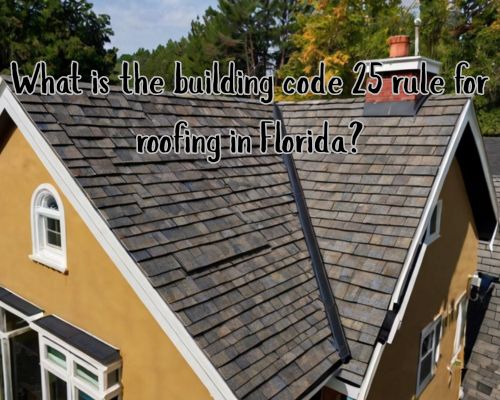
What Is the Building Code 25 Rule for Roofing in Florida? A Guide for West Palm Beach Homeowners
Florida is known for its strict building codes designed to withstand the region’s unique climate challenges, including hurricanes, heavy rainfall, and high humidity. One key regulation that affects homeowners and contractors is Building Code 25 for roofing. But what exactly does this rule entail, and how does it impact roofing projects in West Palm Beach, Florida? This guide explores the specifics of Building Code 25, why it exists, and how it applies to property owners in Palm Beach County.

Understanding Florida’s Building Code 25 Rule for Roofing
Florida’s building codes are continuously updated to enhance safety and durability. The Building Code 25 rule primarily refers to standards for roofing materials, installation methods, and wind resistance requirements. It ensures that roofing systems can withstand Category 4 hurricanes, which bring sustained winds of 130-156 mph.
In West Palm Beach, where tropical storms and hurricanes are common, compliance with this rule is not just a legal requirement—it’s essential for property protection and insurance eligibility. Here’s a breakdown of the core elements of Building Code 25 for roofing:
1. Wind Resistance Requirements
The Florida Building Code (FBC) mandates that roofs in high-wind zones like West Palm Beach must be able to resist wind uplift. For residential properties, this means using hurricane-rated shingles, metal roofing, or reinforced tiles that adhere to Florida Product Approval guidelines.
2. Underlayment Standards
To prevent water intrusion, the law requires that all roofing systems have two layers of underlayment or a self-adhering membrane. This is crucial for protecting homes from storm surges and heavy rainfall.
3. Stricter Fastening Requirements
In regions like Palm Beach County, roofing materials must be secured with six nails per shingle, rather than the traditional four, ensuring enhanced wind resistance. Additionally, metal roofing panels require fasteners that comply with ASTM standards.
4. Roof-to-Wall Connections
The 25% re-roofing rule states that if more than 25% of a roof is replaced within a 12-month period, the entire roof must be brought up to current code standards. This includes installing improved fasteners and hurricane clips to enhance structural integrity.
5. Energy Efficiency & Reflectivity
Florida’s latest updates to Building Code 25 also emphasize cool roofing solutions. Reflective coatings and materials with high solar reflectance index (SRI) help reduce heat absorption, lowering energy costs for homeowners in warm climates like West Palm Beach.
Visit https://guttersofwestpalmbeach.com/ for more.
Why Building Code 25 Matters for West Palm Beach Homeowners
For homeowners in West Palm Beach, adhering to Building Code 25 for roofing is essential for several reasons:
- Insurance Compliance: Many insurance providers require compliance with this code to issue or renew homeowners’ policies, especially after recent legislative changes aimed at reducing storm damage claims.
- Hurricane Preparedness: Given West Palm Beach’s exposure to Atlantic hurricanes, a roof that meets these standards significantly reduces the risk of damage and costly repairs.
- Property Value & Resale Benefits: Homes with up-to-code roofing systems are more attractive to buyers and appraisers, ensuring higher property values.
- Legal Compliance & Permitting: Non-compliance can result in fines, denied permits, or forced re-roofing projects, leading to unnecessary expenses.
Choosing the Right Roofing Materials in Compliance With Code 25
If you’re planning a roofing project in West Palm Beach, selecting the right materials is critical. Here are the most common roofing options that comply with Building Code 25:
- Metal Roofing: Provides high wind resistance and durability, making it one of the best choices for hurricane-prone areas.
- Asphalt Shingles (Class 4 Impact-Resistant): Must be properly fastened and rated for high-wind zones.
- Concrete or Clay Tiles: Ideal for durability, but must be installed with code-compliant adhesives and fasteners.
- Flat Roof Systems: Popular for commercial buildings, requiring reinforced underlayment and proper drainage systems.
Navigating Permits & Inspections in West Palm Beach
Before beginning any roofing project, homeowners must obtain the necessary permits from the City of West Palm Beach. The permitting process typically involves:
- Submitting Roof Plans: Your contractor must provide detailed plans showing compliance with Florida’s Building Code 25.
- Inspection by Local Authorities: After installation, an inspection ensures the roof meets all regulations.
- Final Approval & Documentation: Once approved, you receive documentation verifying compliance, which is essential for insurance claims.
Hiring a Licensed Roofing Contractor
Ensuring that your roofing contractor is licensed and experienced with Florida’s strict building codes is crucial. When selecting a roofer in West Palm Beach, look for:
- State Licensing & Insurance: Verify their Florida roofing license and liability insurance.
- Experience with Hurricane-Proof Roofing: Contractors should have a proven track record of installing roofs that comply with Building Code 25.
- Knowledge of Local Regulations: Roofers like Gutters Of West Palm Beach familiar with West Palm Beach’s permitting process can ensure faster approval and compliance.
Conclusion: Compliance With Building Code 25 Protects Your Home
Understanding and adhering to Florida’s Building Code 25 for roofing is not just a regulatory obligation—it’s a crucial step in protecting your home from severe weather conditions. For homeowners in West Palm Beach, ensuring your roof meets or exceeds these standards guarantees long-term durability, lower insurance premiums, and enhanced property value.
If you’re planning a roofing project, consult with a licensed West Palm Beach roofing contractor to ensure full compliance with the law. Taking these proactive steps today will safeguard your home for years to come, providing peace of mind during Florida’s hurricane season.





